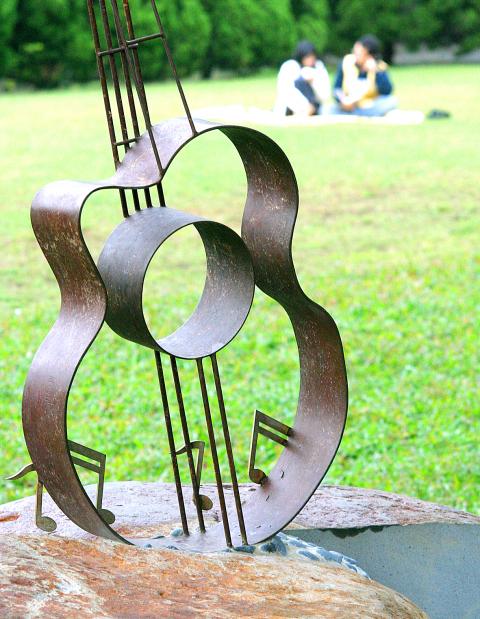Taiwan in Time: Sept. 7 to Sept. 13
Less than a year after he ignited Taiwan’s campus nativist folk song movement by proclaiming “sing our own songs” (唱自己的歌) on stage during a Western folk music event, Lee Shuang-tze (李雙澤) drowned on Sept. 10, 1977 at the age of 28 attempting to save a fellow swimmer.
After Lee’s death, his friends and fellow folk singers Yang Tzu-chun (楊祖珺) and Ara Kimbo, commonly known as Kimbo Hu (胡德夫), premiered an unreleased song, Formosa (美麗島), at his funeral.

Photo courtesy of Tamkang Time
Lee wrote the melody, but the lyrics were adapted by Liang Ching-fong (梁景峰) from an earlier poem, depicting the beauty of Taiwan. However, the song became forever politicized and was even banned by the KMT due to its name being used for Formosa Magazine (美麗島雜誌), a magazine created by the opposition to Chinese Nationalist Party’s (KMT) one-party rule.
The 1979 raid on the magazine’s headquarters and arrest of opposition politicians would become known as the Kaohsiung Incident, also known as the Formosa Incident (美麗島事件), but that is another story.
In the 1970s, Western folk music was popular in Taipei coffeehouses, but there was also a nationalist and nativist sentiment brewing as Taiwan was gradually losing its international political status to China while opposition grew against the KMT regime. Part of this sentiment included many young Taiwanese involving themselves in the “Safeguard the Diaoyutais Movement” (保釣運動). Back then, even though Lee would often sing in Hoklo (commonly know as Taiwanese), he still used “Chinese” (中國人) to describe the people of Taiwan because of the political climate.
Author Ma Shi-fang (馬世芳) retells the incident in his book Subterranean Homesick Blues (地下鄉愁藍調). Lee reportedly took the stage with a guitar and bottle of Coca-Cola during a folk music festival in 1976 at Tamkang University (淡江大學), where mostly Western songs were performed. He wasn’t even originally invited — he came as Ara Kimbo’s replacement, who was unable to sing due to a broken tooth.
There were no recordings or photos of what happened next, and the performance gained legendary status in campus circles, and became immortalized as the “Tamkang Incident” (淡江事件).
When Lee took the stage, he allegedly criticized the previous performer for playing English songs. He had just returned to Taiwan after spending time in the US, Spain and Philippines. Why can’t we sing in our own language, he wondered.
“Before we are able to write our own songs, we should sing the songs of our predecessors,” Lee said, and proceeded to smash the Coca-Cola bottle, a symbol of Western globalization, on the floor.
He then sang the then-banned Hoklo song Mending the Net (補破網) and other classics of that time. The crowd mostly booed him. He switched to English, sang Bob Dylan’s Blowing in the Wind, and reportedly proclaimed, “We should sing our own songs!” before storming off the stage.
The performance was not exactly successful. Many people, Ma included, say that the story is likely to have been embellished as it spread. And whether Lee smashed the bottle remains a point of contention.
But the impact of the incident was significant, as it sparked discussion in campus publications about the lack of and potential for Hoklo-language folk songs. It also inspired college students around the nation to pick up a guitar and start writing their own songs.
Taiwan in Time, a column about Taiwan’s history that is published every Sunday, spotlights important or interesting events around the nation that have anniversaries this week.

Towering high above Taiwan’s capital city at 508 meters, Taipei 101 dominates the skyline. The earthquake-proof skyscraper of steel and glass has captured the imagination of professional rock climber Alex Honnold for more than a decade. Tomorrow morning, he will climb it in his signature free solo style — without ropes or protective equipment. And Netflix will broadcast it — live. The event’s announcement has drawn both excitement and trepidation, as well as some concerns over the ethical implications of attempting such a high-risk endeavor on live broadcast. Many have questioned Honnold’s desire to continues his free-solo climbs now that he’s a

Francis William White, an Englishman who late in the 1860s served as Commissioner of the Imperial Customs Service in Tainan, published the tale of a jaunt he took one winter in 1868: A visit to the interior of south Formosa (1870). White’s journey took him into the mountains, where he mused on the difficult terrain and the ease with which his little group could be ambushed in the crags and dense vegetation. At one point he stays at the house of a local near a stream on the border of indigenous territory: “Their matchlocks, which were kept in excellent order,

Lines between cop and criminal get murky in Joe Carnahan’s The Rip, a crime thriller set across one foggy Miami night, starring Matt Damon and Ben Affleck. Damon and Affleck, of course, are so closely associated with Boston — most recently they produced the 2024 heist movie The Instigators there — that a detour to South Florida puts them, a little awkwardly, in an entirely different movie landscape. This is Miami Vice territory or Elmore Leonard Land, not Southie or The Town. In The Rip, they play Miami narcotics officers who come upon a cartel stash house that Lt. Dane Dumars (Damon)

Jan. 19 to Jan. 25 In 1933, an all-star team of musicians and lyricists began shaping a new sound. The person who brought them together was Chen Chun-yu (陳君玉), head of Columbia Records’ arts department. Tasked with creating Taiwanese “pop music,” they released hit after hit that year, with Chen contributing lyrics to several of the songs himself. Many figures from that group, including composer Teng Yu-hsien (鄧雨賢), vocalist Chun-chun (純純, Sun-sun in Taiwanese) and lyricist Lee Lin-chiu (李臨秋) remain well-known today, particularly for the famous classic Longing for the Spring Breeze (望春風). Chen, however, is not a name